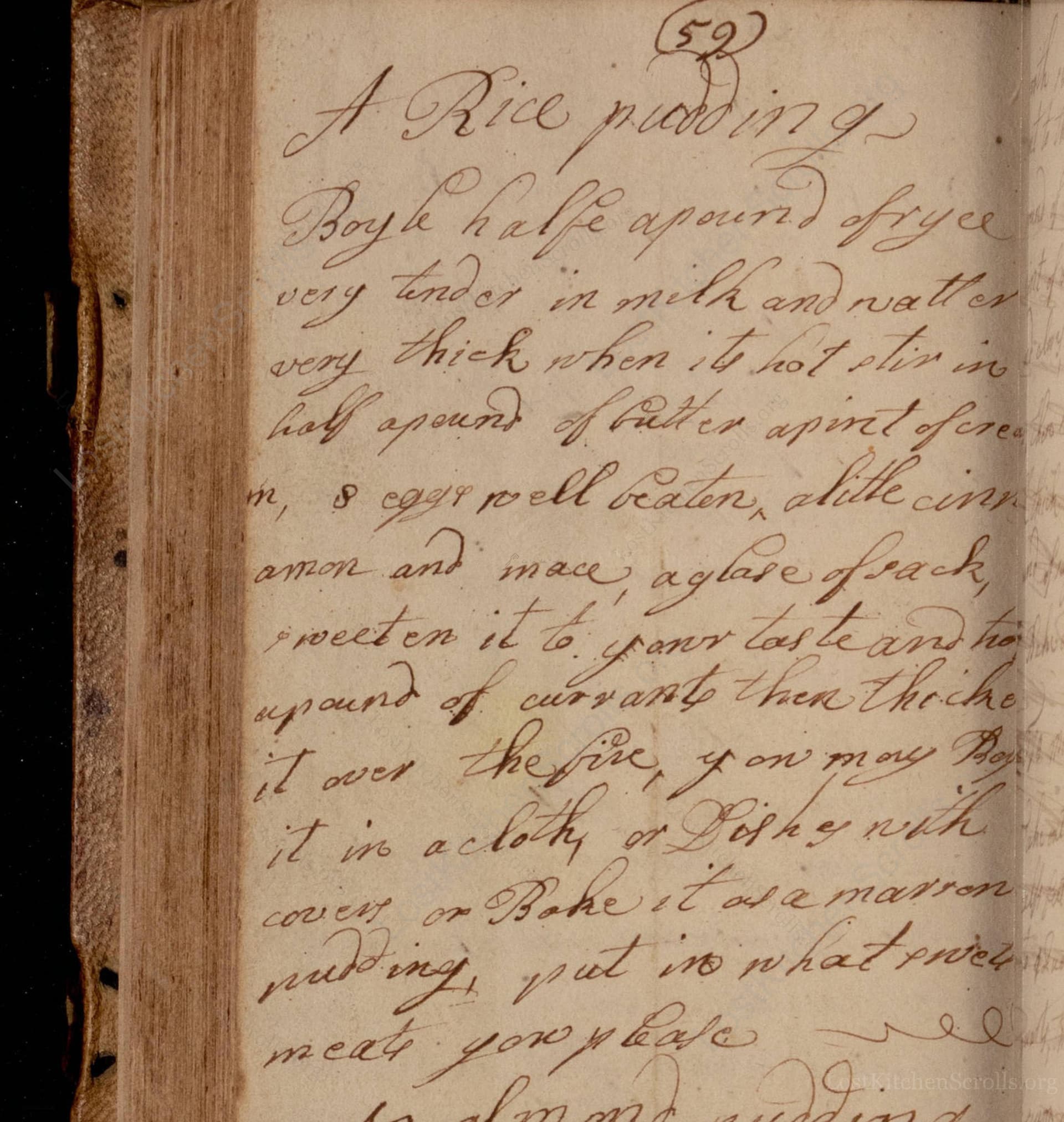A Rice Pudding
From the treasured pages of Receipt book by Christian Barclay Jaffray
Written by Christian Barclay Jaffray

A Rice Pudding
"Boyl halfe a pound of ryce very tender in milk and watter very thick when it is hot stir in half a pound of butterr a pint of cream, 8 eggs well beaten, a little cinnamon and mace, a glase of sack sweeten it to your taste and halfe a pound of currants then thicke it over the fire, you may Boyle it in a cloth, or Dishs with covers or Bake it as a marrow pudding, put in what sweet meats you please"
Note on the Original Text
The original recipe is written in early modern English, characterized by fluid spelling ('boyl' for 'boil,' 'ryce' for 'rice,' 'watter' for 'water') and punctuation that feels informal to modern eyes. Ingredients and processes are intermixed, and precise quantities or detailed instructions are rarely given, relying on the cook’s experience to interpret phrases like 'sweeten it to your taste.' Clarity and context come from familiarity, not from comprehensive detail—a hallmark of early domestic manuscripts.

Title
Receipt book by Christian Barclay Jaffray (1709)
You can also click the book image above to peruse the original tome
Writer
Christian Barclay Jaffray
Era
1709
Publisher
Unknown
Background
A delightful handwritten trove of Scottish culinary secrets and clever home remedies from the late 17th and early 18th centuries, this manuscript whisks readers through age-old recipes and heartfelt family notes—perfect for anyone with a taste for historical kitchens.
Kindly made available by
Penn State University Libraries
This delightful rice pudding recipe hails from a manuscript compiled by Christian Barclay Jaffray, a Scottish Quaker gentlewoman active between 1697 and 1723. Her receipt book is a fascinating window into upper-class Scottish domestic life in the late 17th and early 18th centuries. At the time, cookbooks often included both culinary and medicinal 'receipts,' reflecting the broad responsibilities of women in managing households. Special pudding recipes like this one graced festive tables and demonstrated the use of imported ingredients such as rice, dried fruits, and sack wine, highlighting the increasing global reach of British trade.

In the early 1700s, such a pudding would be cooked over an open hearth. Boiling might be done in a heavy pot or cauldron, with the pudding mixture wrapped securely in a pudding cloth. Alternatively, baking used earthenware or metal dishes, often with lids to keep in moisture. Beating eggs was done by hand with a whisk or fork. Creams, spices, and dried fruits were precious and carefully measured using spoons and scales—often by sight and feel rather than strict measurement.
Prep Time
15 mins
Cook Time
1 hr
Servings
8
We've done our best to adapt this historical recipe for modern kitchens, but some details may still need refinement. We warmly welcome feedback from fellow cooks and culinary historians — your insights support the entire community!
Ingredients
- 8 oz rice
- Equal parts milk and water (enough to cover rice generously, approx. 2 cups each)
- 8 oz unsalted butter
- 1 pint (2 cups) heavy cream
- 8 large eggs
- 1/2 tsp ground cinnamon
- 1/4 tsp ground mace
- 1/4 cup sherry (substitute for sack)
- 8 oz currants (or substitute with raisins, if unavailable)
- Sugar (to taste)
- Optional: Glacé fruits or candied peels for sweetmeats
Instructions
- Begin by boiling 8 oz of rice in a mixture of milk and water (approximately equal parts) until it becomes very tender and thick—think of a dense porridge texture.
- While the rice is still hot, stir in 8 oz of unsalted butter, then mix in 1 pint of heavy cream.
- In a separate bowl, beat 8 large eggs well.
- Add the beaten eggs, a generous pinch each of ground cinnamon and mace, and about 1/4 cup of sherry (as a substitute for sack, a historical fortified wine) to the rice mixture.
- Sweeten to your taste with sugar.
- Finally, fold in 8 oz of currants.
- Gently heat the mixture over low heat to thicken further, without scrambling the eggs.
- At this point, you can: (1) Boil the pudding in a cloth; (2) Bake it in covered dishes, or; (3) Prepare it as a 'marrow pudding,' baking it with added sweetmeats, if desired.
- Serve warm or cold.
Estimated Calories
540 per serving
Cooking Estimates
You’ll spend about 15 minutes prepping and 1 hour cooking. This recipe serves 8 people, with each serving containing around 540 calories.
As noted above, we have made our best effort to translate and adapt this historical recipe for modern kitchens, taking into account ingredients nowadays, cooking techniques, measurements, and so on. However, historical recipes often contain assumptions that require interpretation.
We'd love for anyone to help improve these adaptations. Community contributions are highly welcome. If you have suggestions, corrections, or cooking tips based on your experience with this recipe, please share them below.
Join the Discussion
Rate This Recipe

Den Bockfisch In Einer Fleisch Suppen Zu Kochen
This recipe hails from a German manuscript cookbook compiled in 1696, a time whe...

Die Grieß Nudlen Zumachen
This recipe comes from a rather mysterious manuscript cookbook, penned anonymous...

Ein Boudain
This recipe comes from an anonymous German-language manuscript cookbook from 169...

Ein Gesaltzen Citroni
This recipe, dating from 1696, comes from an extensive anonymous German cookbook...
Browse our complete collection of time-honored recipes



